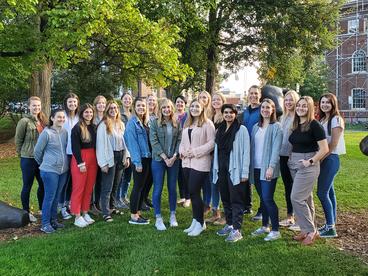The University of Minnesota Dietetic Internship is 37 weeks in duration, beginning in early September with a one- and one-half week orientation, and concludes with a program completion ceremony and celebration at the end of May. There are two weeks of vacation from late December to early January.
U of M DI interns need to possess the following personal characteristics to succeed in this fast-paced, multi-disciplinary program:
- Increased maturity level (due to high expectations of program and preceptors)
- Excellent interpersonal communication skills (due to multitude of preceptors and other associated professionals)
- Ability to work well independently and in groups (due to autonomous nature of individual rotation schedules, with opportunities for advanced level of project teamwork)
- Perseverance, adaptability, and flexibility (due to extensive experiences and fast-paced rotations)
Rotations
- Rotations refer to the scheduled time for learning experiences where interns work under the direction and supervision of professionals in the field (commonly referred to as preceptors).
- The master rotation schedule is determined by the program leadership team with assistance from each concentration’s internship coordinator and the various partner sites.
- The schedule is based on factors such as timing, site and preceptor availability. Scheduling of experiences is unique to each facility and will be done by the site preceptor for that facility. This will usually be done at the beginning of a rotation, but may change during the experience. Interns should not commit to other activities before the schedule is known.
- All schedules and supervised practice experiences are subject to change each year.
- Rotations will last anywhere from a few days to multiple weeks.
- Each rotation has at least one preceptor.
- Most rotations will be structured and will include homework, assignments and/or projects. Interns should anticipate approximately 40 hours per week, and that weekly schedules will vary and may include some early morning, evening, weekend, or holiday assignments.
- Interns are expected to be flexible and adapt to each facility.
General Rotation Schedule Framework
- 2 weeks Orientation
- 14 weeks Clinical
- 8 weeks Concentration (i.e. Eating Disorders or Additional Clinical)
- 4 weeks Community
- 4 weeks Foodservice Systems & Management
- 2 weeks Additional Rotation and/or Program-focused Projects
- 3 weeks Vacation
Potential additional experiences may include activities related to public policy, sustainability, counseling, communications, and leadership
Holidays
The University of Minnesota Twin Cities campus holidays may not be time off while in the U of M Dietetic Internship Program. Any requirements for observance of specific religious activities must be communicated in writing to the program prior to orientation. Arrangements will then be negotiated by the intern with the site preceptor in coordination with the Internship Director.
Emergency absences must be communicated to and arranged with the leadership team. If emergency absences exceed three days, additional time in the Dietetic Internship may be required.
Orientation

Prior to rotations, interns participate in two weeks of program orientation. This is a time to become familiar with other interns, the DI team, sites and preceptors while learning about the details of the internship and resources available during the program. To help interns thrive and succeed, we discuss our program handbook along with our policies and procedures manual; thoroughly review our program's online learning management system; as well as allocate time with our partner sites, The Emily Program and M Health Fairview.
Classes and Workshops
U of M DI interns will have classes scheduled with one another, in addition to workshops with interns from other internships within the Twin Cities. Classes are designed to give interns new insights and perspectives on the field of nutrition as well as prepare them for their future careers as dietitians.
Classes vary and often include guest speakers presenting on a specific area in nutrition. Class topics may include:
- Supervised practice discussions
- Intern case study presentations
- Medical Nutrition Therapy presentations, such as:
- Parenteral Nutrition
- Solid Organ and/or Bone Marrow Transplant Nutrition
- Pediatric Nutrition Assessment and Formulary
- Eating Disorders presentations, such as:
- Finding Body Positivity in the Online World
- Weight-Inclusive Care
- Dysphagia
- Sports Nutrition
- RDN exam preparation
- Registration and Licensure
- Career Prep Workshop
Interns may also attend state-wide nutrition meetings, conferences, and symposiums whenever possible.
Projects
In addition to the scheduled class times, there will be out-of-class individual and group assignments/projects. These may include:
- Career portfolio
- Farm tour(s)
- Communications and social media
- Legislative and public policy initiatives